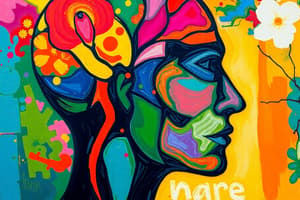Podcast
Questions and Answers
Which statement best describes the relationship between nature and nurture in the context of the self?
Which statement best describes the relationship between nature and nurture in the context of the self?
- Nature and nurture work independently to shape the self.
- The self is solely a product of either nature or nurture.
- The self is exclusively determined by social influences.
- The self is a product of both nature and nurture. (correct)
What aspect of identity distinguishes one individual from another?
What aspect of identity distinguishes one individual from another?
- The perception of others regarding the person
- Social and environmental influences
- Beliefs and characteristics that define the individual (correct)
- Genetic traits inherited from parents
Which of the following is NOT a component of identity?
Which of the following is NOT a component of identity?
- Genetic makeup (correct)
- Personal beliefs and values
- Social relations and roles
- Group membership
How can the concept of the 'self' be described?
How can the concept of the 'self' be described?
What role does family play in the development of the self?
What role does family play in the development of the self?
Which of the following most accurately reflects the concept of self as described in the content?
Which of the following most accurately reflects the concept of self as described in the content?
Which time frame does the concept of identity NOT consider?
Which time frame does the concept of identity NOT consider?
In terms of the self, which of the following statements is accurate?
In terms of the self, which of the following statements is accurate?
What does egocentrism primarily focus on?
What does egocentrism primarily focus on?
How is cultural relativism best defined?
How is cultural relativism best defined?
Which term describes a belief in the superiority of one's own culture?
Which term describes a belief in the superiority of one's own culture?
What is the primary characteristic of xenocentrism?
What is the primary characteristic of xenocentrism?
What role does anthropology play in understanding the self?
What role does anthropology play in understanding the self?
What does the "FREEDOM OF INDIVIDUALS TO AUTHOR THEIR OWN SOUL" emphasize?
What does the "FREEDOM OF INDIVIDUALS TO AUTHOR THEIR OWN SOUL" emphasize?
According to Hume, what is the nature of the self?
According to Hume, what is the nature of the self?
What are impressions according to David Hume?
What are impressions according to David Hume?
What is Immanuel Kant's stance on the role of reason in knowledge acquisition?
What is Immanuel Kant's stance on the role of reason in knowledge acquisition?
What does Gilbert Ryle argue regarding the concept of the self?
What does Gilbert Ryle argue regarding the concept of the self?
What does Kant believe is necessary to formulate knowledge from experiences?
What does Kant believe is necessary to formulate knowledge from experiences?
Which philosopher emphasized the importance of early impressions on self-development?
Which philosopher emphasized the importance of early impressions on self-development?
What is the relationship between impressions and ideas in Hume's philosophy?
What is the relationship between impressions and ideas in Hume's philosophy?
What does the duality approach to self suggest?
What does the duality approach to self suggest?
According to Maurice Merleau-Ponty, how is the self experienced?
According to Maurice Merleau-Ponty, how is the self experienced?
What is Paul Churchland's view on the nature of the self?
What is Paul Churchland's view on the nature of the self?
Which field primarily examines interpersonal relations within society?
Which field primarily examines interpersonal relations within society?
What does the scientific perspective on the self concentrate on?
What does the scientific perspective on the self concentrate on?
In the study of self, physical sciences primarily focus on which aspect?
In the study of self, physical sciences primarily focus on which aspect?
What is a key implication of the duality approach regarding self-perception?
What is a key implication of the duality approach regarding self-perception?
Paul Churchland's eliminative materialism argues what about the mind?
Paul Churchland's eliminative materialism argues what about the mind?
What must work harmoniously in a person to attain justice and virtue according to Plato?
What must work harmoniously in a person to attain justice and virtue according to Plato?
What aspect of human nature did Plato emphasize?
What aspect of human nature did Plato emphasize?
How did Aristotle describe reason in a person's life?
How did Aristotle describe reason in a person's life?
What is the concept associated with Aristotle that emphasizes moderation?
What is the concept associated with Aristotle that emphasizes moderation?
Which philosopher emphasized that happiness can be found only in God?
Which philosopher emphasized that happiness can be found only in God?
According to St. Augustine, what does the soul in possession of a body represent?
According to St. Augustine, what does the soul in possession of a body represent?
What is the primary focus of human happiness according to Aristotle?
What is the primary focus of human happiness according to Aristotle?
How did Plato view the soul in relation to birth and death?
How did Plato view the soul in relation to birth and death?
Flashcards are hidden until you start studying
Study Notes
Overview of Self / Identity
- The self comprises the "I" (personal self) and the "me" (social self).
- Identity encompasses traits, beliefs, social relations, roles, and social group membership.
Nature vs Nurture
- The self is a product of both nature (biological predispositions) and nurture (life experiences).
- Traits and behaviors are transmitted across generations through biology.
- Group life influences individual behavior and attitudes, impacting self-construal.
Identity vs Self
- Identity is how individuals distinguish themselves based on qualities, beliefs, and social connections.
- The self refers to the true essence of a person known only to themselves, encompassing total characteristics both known and unknown.
Dimensionalities of the Self
- Social factors, especially family, significantly shape attitudes and behaviors.
- Plato emphasized the harmony of the soul's parts for achieving justice and virtue.
Contributions of Philosophers
- Plato (427-348 B.C.): Focused on the soul's eternity and social nature of humans. Believed in knowledge through the soul and moral good as striving for ideals.
- Aristotle (384-322 B.C.): Advocated for reason as supreme and personal excellence achieved through moderation (Golden Mean). Happiness results from virtuous living.
- St. Augustine (354-430 A.D.): Associated self with the relationship to God, emphasizing that understanding of self is intertwined with divine love and the quest for inner peace.
- John Locke: Suggested early impressions shape identity but can be reassessed, promoting freedom in character development except for basic human identity.
- David Hume (1711-1776): Described self as a bundle of perceptions, categorized into impressions (direct experiences) and ideas (reflections on experiences).
- Immanuel Kant (1724-1804): Proposed the self synthesizes experiences into knowledge, transcending consciousness.
- Gilbert Ryle (1900-1976): Argued self comes from observable behavior rather than inner thoughts or beliefs.
Contemporary Philosophers
- Maurice Merleau-Ponty: Highlighted the interconnectedness of mind and body as vital to identity and self-experience.
- Paul Churchland: Advocated for eliminative materialism, asserting the self arises from brain functions, rejecting non-physical mind concepts.
Scientific Perspectives on Self
- Scientific approaches explore how life forms evolve, with a fundamental focus on biological and environmental influences on the self.
- Physical sciences investigate biological factors related to the human body, growth, and maturation.
- Social sciences examine institutions, cultures, and interpersonal relations impacting individual identity.
Models of the Self
- Egocentric: Views the world in relation to oneself and emphasizes authenticity.
- Sociocentric: Centers perspective on group membership and societal acceptance.
Cultural Relativism
- Cultural relativism asserts beliefs and practices should be understood within individual cultural contexts, rejecting absolute judgments.
- Ethnocentrism and Xenocentrism describe opposing views regarding cultural superiority.
Summary
- Anthropology studies human cultures and the self as an evolving construct shaped by psychological and social elements, emphasizing the significance of cultural and environmental connections in the journey of self-discovery.
Studying That Suits You
Use AI to generate personalized quizzes and flashcards to suit your learning preferences.




